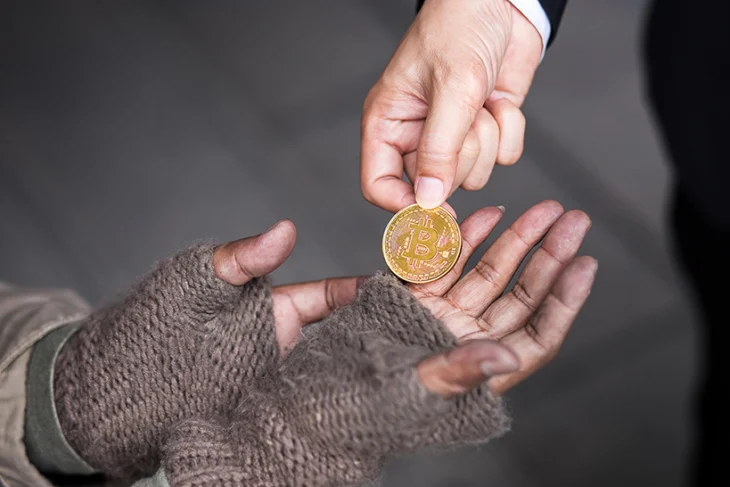In the last year, bitcoin and other cryptocurrencies have seen a surge in popularity, with more individuals than ever before investing in them.
Bitcoin donations, on the other hand, have seen significant growth in popularity. Generous contributors can now donate Bitcoin or make a Bitcoin gift to a growing number of charities, with significant benefits for both parties.
But how do you get started donating to NGOs with cryptocurrency, and which groups have already made the switch? In the year 2024, who will be the first to accept Bitcoin donations?
In this short guide, we’ll walk you through all you really want to be familiar with a noble cause that acknowledges Bitcoin, so you can begin supporting the causes you care about the most in the way that suits you best!
Contents
1. Decide Which Cryptocurrency To Donate

Source: salvationarmy.org
You’ve probably heard of Bitcoin, the most valuable crypto asset by market capitalization, but there is a slew of altcoins (cryptos that aren’t Bitcoin) to choose from. Experts believe that cryptocurrencies such as Ethereum, Solana, and Avalanche are improving blockchain technology, which is the fundamental technology that cryptocurrencies run on.
It may be difficult to choose one of the many cryptos being launched every day to enable new developments like NFTs. However, experts advise sticking with the more well-known, established cryptos when purchasing these digital assets for yourself or a charity, especially if you are a beginner.
To create a trading account and start trading cryptocurrency, visit bitcoinprofitpro.com/de.
2. Transparent Way Of Donation
Compared to traditional currencies, cryptocurrency donations are more transparent, speedier, and cost-effective. Because the blockchain ledger is open to the public, the flow of money is extremely transparent — perhaps even more so than traditional currency systems, which rely on third parties to intervene and monitor transactions. This saves money on both fees and time.
3. No High Transaction Fee
Donations in cryptocurrency put more money in the hands of nonprofits. For all parties involved, they come with low — if any — processing fees. This ensures that a greater portion of the donation goes toward the non-profit organization. The recipient of the non-profit organization also classifies the donation as a non-cash gift when filing their taxes.
4. Secure Transaction Method

Source: trendhunter.com
Cryptocurrency is becoming increasingly secure. If they aren’t already dabbling or involved, the most advanced technical professionals are making their way into the industry. As these industry experts make the shift to crypto, they’re laying the groundwork for everything from safe storage to dispute resolution. While security has clearly improved, vulnerabilities will always exist. Fortunately, the insurance market is warming to the field and introducing coverage to cover specific losses. This will very certainly provide would-be donors even more peace of mind when deciding whether or not to donate in cryptocurrency.
5. Anonymity Stays Intact
Donations can still be made anonymously, which helps to expand the donor base for various causes. While the public ledger provides accountability in the flow of money, it is not always linked to personal identification. This may be a substantial benefit for many philanthropists who desire to stay anonymous. In the traditional charitable paradigm, such donors would have to put their trust in the organization to keep their identities hidden. Contributing with cryptocurrency may assist in soothing the mind of anyone who is hesitant to donate because of this thinking.
6. Tech-Savvy Method
Donations in cryptocurrency appeal to the tech-savvy and rich. Many nonprofits are focused on providing innovative support, whether it’s to help those who are poor, disabled, or have unequal educational possibilities. Crypto participation alone is a buy-in to advancement and innovation because of its standing as a new technology that combines technology and entrepreneurship. According to an October 2018 Edelman research, 74 percent of affluent millennials believe that innovations like blockchain will improve financial system security. Accepting cryptocurrency donations puts your organization in front of this wealthy audience.
7. Methods Of Donating Crypto
A crypto exchange is an option. You can transfer crypto to the public address of the organization you’re donating to if it already has one. If you want to surprise them, you’ll have to ask them for the address, which may not work.
A paper wallet can be used. A public and private key is necessary for cryptocurrency transactions. The public key is similar to your bank account number, while the private key is similar to your personal identification number (PIN). A paper wallet is a safe way to print the key on a piece of paper (often using a QR code). The recipient scans the code and deposits the cryptocurrency into their preferred wallet.
8. Secure Your Wallet
Both you and your recipient will require a cryptocurrency wallet to send and receive cryptocurrency. These are used to keep your money safe and secure.
There are various wallets to choose from, and there are several factors to consider when deciding which one is right for you, such as whether you’re a beginner, whether you want to store only Bitcoin or other cryptos, and whether you want to access your wallet on your phone or on your computer.
Sharing your public key wallet address is fine, but sharing your private key is never a good idea. Consider using a hardware or cold cryptocurrency wallet to protect your wallet’s private keys. A hardware wallet, also known as a cold wallet, is a cryptocurrency wallet that is not linked to the internet and hence less vulnerable to hacking. You may lose access to your bitcoin if you lose track of your hardware wallet or it malfunctions.
Conclusion
Giving cryptocurrency as a gift offers recipients something of value while also introducing them to a vibrant ecosystem of distributed financial goods and apps. Because bitcoin is so simple to send, it may be a better donation than cash or other forms of money. Simply keep track of any prospective tax liabilities and double-check the wallet address whenever possible. If you follow these steps, both you and your recipient should have a great experience with cryptocurrency donations.

